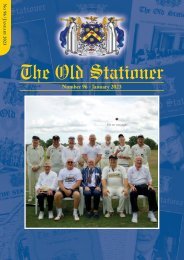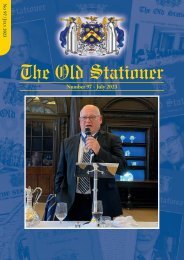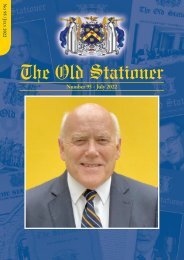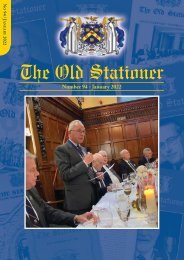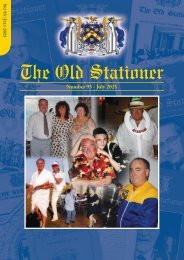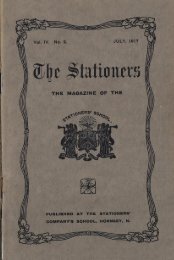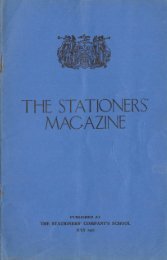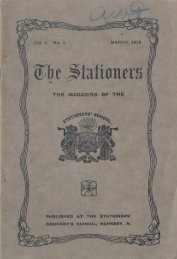OSAmag81
You also want an ePaper? Increase the reach of your titles
YUMPU automatically turns print PDFs into web optimized ePapers that Google loves.
T h e O l d S t a t i o n e r - N o 8 1<br />
this production the part of Private Attercliffe was played by<br />
Stephen Jeffreys, 1961-1968; Bludgeon, the Bargee by Martin<br />
Lawrence, 1963-1970; The Constable by Tim Westbrook, 1962-<br />
1969; The Mayor, Nigel Dant, 1963-1971; Officer of Dragoons<br />
by Graham Hobbs, 1962-1969; Design by Keith M. Hewett;<br />
Communication and Painting, by Geoffrey T. Dent; Lighting<br />
and Sound by John Leeming; Front of House, Daniel J. Bone.<br />
1969 HOBSON'S CHOICE December 1969<br />
1970 THE SERVANT OF TWO MASTERS December 1970<br />
1971 THE HAPPY APPLE December 1971<br />
1973 OF MICE AND MEN April 1973 by John Steinbeck<br />
took place on the 4th,5th, 6th April, 1973. In this production<br />
Carlson was played by Dave Fuller; Lighting and Sound, John<br />
Leeming;<br />
“It's gonna be nice there. Ain't gonna be no trouble, no fights.<br />
Nobody ever gonna hurt nobody, or steal from 'em. It's gonna be<br />
– nice.”<br />
The place across the river which George and Lennie, his simple<br />
travelling companion, hope to reach is familiar, in one form or<br />
another, to the dreams of most men. The play is set in the 1930s,<br />
but its theme, and the timeless quest involved, retains, perhaps<br />
more than ever, today.<br />
John Steinbeck was born in California in 1902 and educated at<br />
Salinas High School and Stanford University. His first book,<br />
Cup of Gold, was published in 1929. He wrote several articles<br />
about the injustice suffered by the displaced persons of California,<br />
the migratory agricultural workers, and in 1939 'The Grapes of<br />
Wrath' was published. Controversial feeling reached such a pitch<br />
that Steinbeck had to leave the United States for several years,<br />
including the war period, and he travelled extensively in Europe<br />
as a war columnist. His later novels include, Of Mice and Men,<br />
from which this play is adapted. In 1940 he was awarded the<br />
Pullitzer Prize and in 1962, the Nobel Peace Prize for Literature.<br />
1973 PASSION, POISON and PETRIFACTION July 1973<br />
1973 SWEENY TODD December 1973. A Victorian<br />
Melodrama by Alan Rosser was produced in the same year, on<br />
the 12th,13th, and 14th December , 1973. Dave Fuller, 1967-<br />
1974 acted the part of Mark Ingesgrie. Michael Morrison, 1967-<br />
1974 was the Stage Manager; Ian Morrison, 1970-1976 in the<br />
Stage Team. Sound by John Leeming and Raymond Borella,<br />
1968-1975; Make-up, Mary Pryor. Hot pies will be sold in the<br />
interval!<br />
1974 THE GHOST TRAIN by Arnold Ridley took place on<br />
the 11th,12th and 13th December 1974. Teddie Deakin was<br />
played by Richard Griffiths,1968-1975; Herbert Price by Richard<br />
Comerford 1968-1975; John Leeming and Raymond Borella,<br />
1968-1975, Sound and Lighting; Mary Pryor, Make-up.<br />
The Ghost train was first performed at the St. Martin's Theatre<br />
in London in 1925 and its author was a young actor named<br />
Arthur Ridley, better known now as 'Godfrey' of 'Dads Army'<br />
on TV. One might ask why 'The Ghost Train' has lasted when<br />
so many other plays of that fragile theatrical era have vanished.<br />
For at first sight 'The Ghost Train' is just another example of<br />
that popular twenties artform – the comedy thriller. But 'The<br />
Ghost Train' has outlived the rest because of its superb situation<br />
and the sheer suspense of its plot. Who could think of a more<br />
tense situation than to have six people stranded for the night in<br />
a deserted Cornish station haunted by the ghost of a train which<br />
crashed twenty years previously! Linked with the situation, have<br />
traditionally gone the sound effects that are now part of the<br />
play's reputation. In 'The Ghost Train' it is the drama and<br />
comedy of the situation that has carried the play along for three<br />
generations,<br />
1975 ERNIE'S INCREDIBLE HALLUCINATIONS by<br />
Alan Ayckbourn took place on the 10th,11th, 12th December<br />
1975 followed by THE REAL INSPECTOR HOUND.<br />
Members of the OSA today who took part in the first of these<br />
productions are Andrew Devon, 1972-1979 acting the part<br />
of'Mum'. In The Real Inspector Hound, Ian Morrison, acted the<br />
part of 'The Body', and was Stage Manager and helped out on<br />
Business Management. Michael Morrison,1967-1974 was in the<br />
stage team. John Leeming was on Lighting and Sound. Peter<br />
Maddigan, 1969-1976 was on Front of House.<br />
1976 CRACKERS, A Christmas Revue, took place on the<br />
15th,16th, and 17th December 1976. Mary Pryor and Michael<br />
Fitch sang in the Opening Chorus. John Leeming was again on<br />
Sound.<br />
1977 ANDROCLES AND THE LION by George Bernard<br />
Shaw, and LITTLE BROTHER LITTLE SISTER by David<br />
Campton, took place on the 14th,15th and 16th December 1977.<br />
In this production Charles Zarb acted the part of Ferrovius;<br />
Michael Howell, 1973-1980, acted the part of Spintho.<br />
The Stage Crew included, Michael Morrison, Keith Roberts,<br />
1971-1978, and Glen Catlin 1971-1978. John Leeming on<br />
Sound. Mary Pryor on Make-up.<br />
ANDROCLES. The central theme of Androcles and the Lion is<br />
that men must have something worth dying for to make life<br />
worth living; in other words, an end outside oneself is essential<br />
for human existence. Shaw regarded religion as something to<br />
30



